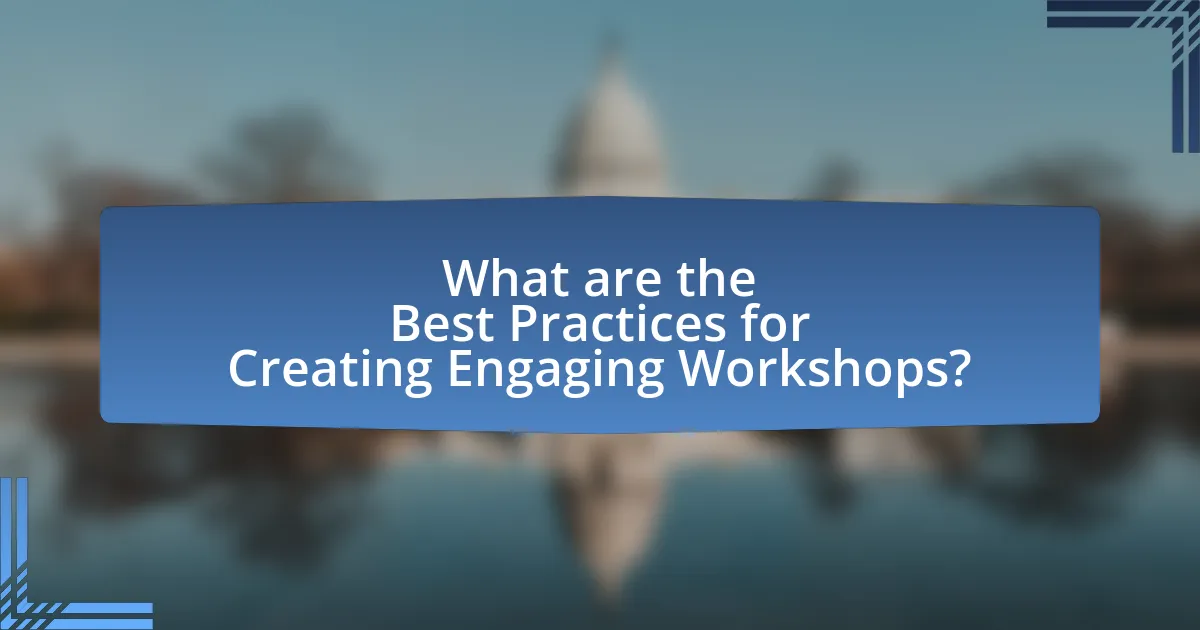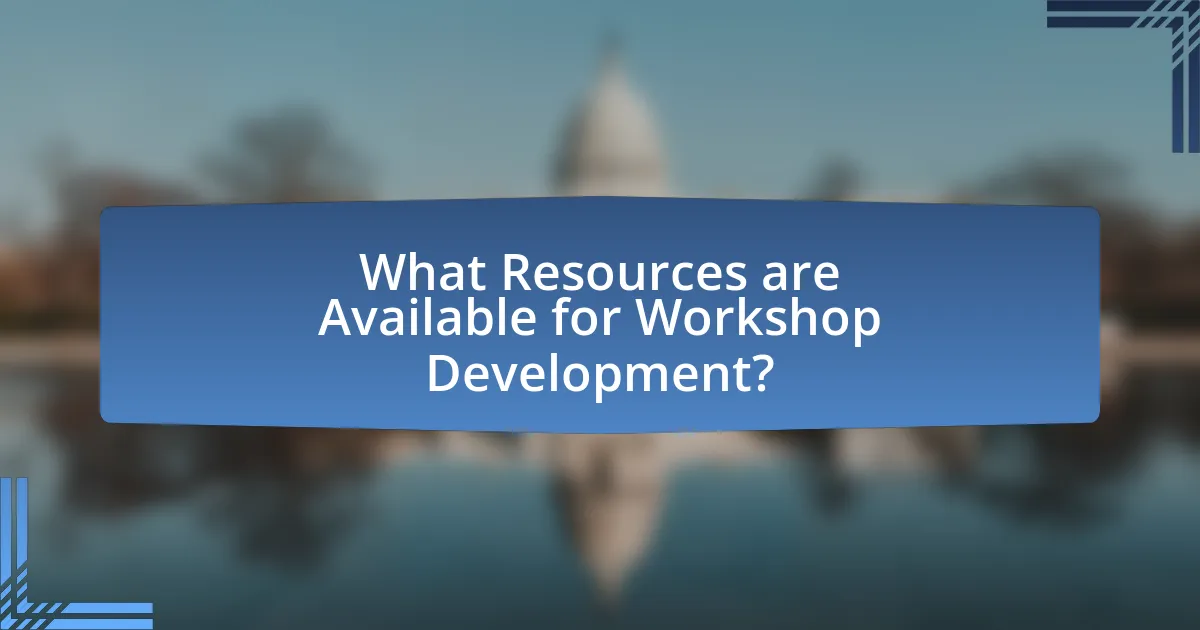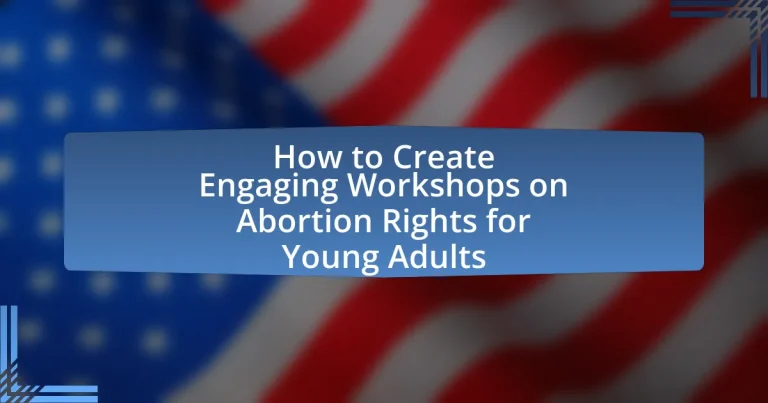Engaging workshops on abortion rights for young adults are interactive educational sessions aimed at informing participants about reproductive rights, legal frameworks, and advocacy strategies. These workshops utilize discussions, role-playing, and multimedia presentations to enhance understanding and encourage active participation. Key topics include reproductive health education, legal rights, access to services, stigma, and advocacy skills, all designed to empower young adults to engage in advocacy effectively. The article outlines best practices for creating these workshops, including fostering inclusivity, addressing sensitive topics, and utilizing technology to enhance engagement. Additionally, it emphasizes the importance of young adults in shaping abortion rights advocacy and provides resources for facilitators to develop impactful workshops.

What are Engaging Workshops on Abortion Rights for Young Adults?
Engaging workshops on abortion rights for young adults are interactive educational sessions designed to inform participants about reproductive rights, legal frameworks, and advocacy strategies. These workshops often incorporate discussions, role-playing, and multimedia presentations to enhance understanding and encourage active participation. Research indicates that interactive learning methods significantly improve retention and engagement, making these workshops effective in empowering young adults to advocate for their rights and the rights of others.
How can workshops effectively address abortion rights?
Workshops can effectively address abortion rights by providing education, fostering dialogue, and empowering participants to advocate for their rights. These workshops can include expert-led discussions on legal frameworks, personal narratives, and the impact of policies on individuals’ lives, which helps participants understand the complexities surrounding abortion rights. For instance, a study by the Guttmacher Institute highlights that comprehensive education on reproductive health significantly increases awareness and advocacy among young adults. By creating a safe space for open conversations, workshops can also encourage participants to share their experiences and concerns, thereby building a supportive community that actively engages in advocacy efforts.
What key topics should be included in these workshops?
Key topics that should be included in workshops on abortion rights for young adults are reproductive health education, legal rights regarding abortion, access to services, stigma and misinformation surrounding abortion, and advocacy skills. Reproductive health education provides foundational knowledge about bodily autonomy and reproductive choices. Legal rights regarding abortion inform participants about current laws and regulations, which vary by region. Access to services addresses the practical aspects of obtaining abortion care, including financial and logistical barriers. Stigma and misinformation are critical to discuss, as they can influence perceptions and decisions about abortion. Advocacy skills empower young adults to engage in activism and support reproductive rights effectively. These topics are essential for fostering informed, engaged, and proactive participants in the conversation around abortion rights.
How do different perspectives on abortion rights influence workshop content?
Different perspectives on abortion rights significantly influence workshop content by shaping the topics covered, the language used, and the overall approach to the subject. For instance, workshops that adopt a pro-choice perspective may focus on reproductive autonomy, access to healthcare, and personal stories of individuals affected by abortion laws, while those with a pro-life stance might emphasize the moral implications of abortion, alternatives to abortion, and advocacy for fetal rights. This divergence in focus necessitates tailored content that resonates with the beliefs and values of the participants, ensuring that discussions are relevant and engaging. Research indicates that workshops designed with an understanding of these varying viewpoints can foster more productive dialogues, as they address the concerns and motivations of diverse audiences, ultimately enhancing the educational experience.
Why is it important to engage young adults in discussions about abortion rights?
Engaging young adults in discussions about abortion rights is crucial because they represent a significant demographic that will shape future policies and societal norms. Young adults are often at a pivotal stage in their lives where they are forming opinions and values, making it essential to provide them with accurate information and diverse perspectives on abortion rights. Research indicates that individuals who engage in discussions about reproductive rights are more likely to advocate for policies that support access to safe and legal abortion services, as seen in studies conducted by the Guttmacher Institute, which highlight the correlation between informed youth and progressive policy advocacy. Therefore, fostering these discussions not only empowers young adults but also contributes to a more informed and active citizenry regarding reproductive health issues.
What role do young adults play in shaping abortion rights advocacy?
Young adults play a crucial role in shaping abortion rights advocacy by actively participating in grassroots movements, utilizing social media for awareness, and influencing policy through voting and activism. Their engagement has been pivotal in recent campaigns, such as the 2022 protests following the overturning of Roe v. Wade, where young activists mobilized large crowds and generated significant media attention. According to a 2021 survey by the Pew Research Center, 70% of young adults support legal abortion, highlighting their alignment with pro-choice values and their potential to sway public opinion and legislative outcomes.
How can workshops empower young adults to take action?
Workshops can empower young adults to take action by providing them with knowledge, skills, and a supportive environment that fosters engagement. Through interactive activities, participants gain a deeper understanding of abortion rights, which enhances their ability to advocate effectively. Research indicates that experiential learning, such as that found in workshops, significantly increases retention of information and motivates individuals to act on issues they care about. For instance, a study by the National Youth Rights Association found that youth who participated in advocacy workshops were 60% more likely to engage in activism compared to those who did not. This evidence demonstrates that workshops not only inform but also inspire young adults to take concrete steps toward advocacy and change.

What are the Best Practices for Creating Engaging Workshops?
The best practices for creating engaging workshops include interactive activities, clear objectives, and participant involvement. Interactive activities, such as group discussions and role-playing, foster engagement and enhance learning retention. Establishing clear objectives helps participants understand the purpose of the workshop, guiding their focus and expectations. Encouraging participant involvement through questions and feedback creates a collaborative environment, making the workshop more dynamic and relevant. Research indicates that workshops incorporating these elements lead to higher satisfaction and effectiveness, as evidenced by a study published in the Journal of Educational Psychology, which found that interactive learning environments significantly improve participant engagement and knowledge retention.
How can facilitators create an inclusive environment?
Facilitators can create an inclusive environment by actively promoting diverse perspectives and ensuring that all participants feel valued and respected. This can be achieved through establishing ground rules that encourage open dialogue, using inclusive language, and incorporating materials that reflect a variety of experiences and backgrounds. Research indicates that inclusive environments enhance participation and learning outcomes, as seen in studies showing that diverse groups generate more innovative solutions and foster a sense of belonging among participants.
What strategies can be used to encourage participation and dialogue?
To encourage participation and dialogue in workshops on abortion rights for young adults, facilitators should implement interactive activities such as small group discussions, role-playing scenarios, and Q&A sessions. These strategies foster a safe environment where participants feel comfortable sharing their thoughts and experiences. Research indicates that interactive formats increase engagement; for instance, a study by the National Institute for Health Research found that participatory methods enhance learning outcomes and retention of information. Additionally, establishing ground rules for respectful communication can further promote open dialogue, ensuring that all voices are heard and valued.
How can facilitators address sensitive topics effectively?
Facilitators can address sensitive topics effectively by creating a safe and respectful environment for discussion. Establishing ground rules at the beginning of the workshop encourages open dialogue while ensuring participants feel secure in expressing their thoughts. Research indicates that when facilitators actively listen and validate participants’ feelings, it fosters trust and encourages deeper engagement. For instance, a study published in the Journal of Social Issues highlights that empathetic communication significantly enhances participants’ willingness to share personal experiences related to sensitive subjects.
What methods can be employed to enhance engagement during workshops?
Interactive activities, such as group discussions and role-playing scenarios, can significantly enhance engagement during workshops. These methods encourage participants to actively contribute and share their perspectives, fostering a collaborative learning environment. Research indicates that interactive learning techniques can improve retention and understanding of complex topics, such as abortion rights, by allowing participants to apply concepts in real-world contexts. For instance, a study published in the Journal of Educational Psychology found that students who engaged in active learning scored higher on assessments compared to those who received traditional lectures. Therefore, incorporating interactive elements into workshops can lead to a more engaged and informed audience.
How can interactive activities be integrated into the workshop format?
Interactive activities can be integrated into the workshop format by incorporating group discussions, role-playing scenarios, and hands-on exercises that encourage participation. These methods foster engagement and allow participants to actively explore abortion rights issues in a collaborative environment. For instance, using case studies related to abortion rights can prompt small group discussions, enabling participants to analyze different perspectives and develop critical thinking skills. Research indicates that workshops that include interactive elements significantly enhance learning outcomes and retention, as evidenced by a study published in the Journal of Educational Psychology, which found that active learning strategies improve understanding and engagement among young adults.
What role does technology play in engaging young adults?
Technology plays a crucial role in engaging young adults by facilitating communication, providing access to information, and enabling interactive experiences. Digital platforms such as social media, mobile applications, and online forums allow young adults to connect with peers, share ideas, and participate in discussions about important topics like abortion rights. According to a Pew Research Center study, 95% of young adults use smartphones, which enhances their ability to access resources and engage in advocacy efforts. Furthermore, technology enables the creation of interactive workshops through tools like webinars and virtual reality, making learning more dynamic and appealing to this demographic.

What Resources are Available for Workshop Development?
Resources available for workshop development on abortion rights for young adults include educational materials, training programs, and online platforms. Educational materials such as pamphlets, articles, and research papers provide foundational knowledge on abortion rights and related issues. Training programs offered by organizations like Planned Parenthood and the Guttmacher Institute equip facilitators with skills to effectively engage participants. Online platforms, including webinars and social media groups, facilitate discussions and share best practices among workshop leaders. These resources collectively enhance the effectiveness and engagement of workshops focused on abortion rights.
What materials and tools can support workshop facilitators?
Workshop facilitators can be supported by a variety of materials and tools, including presentation software, handouts, interactive activities, and feedback mechanisms. Presentation software like PowerPoint or Google Slides allows facilitators to visually convey information, while handouts provide participants with key points and resources for further learning. Interactive activities, such as group discussions or role-playing scenarios, engage participants and encourage active participation. Feedback mechanisms, such as surveys or reflection forms, enable facilitators to assess the effectiveness of the workshop and make necessary adjustments for future sessions. These tools collectively enhance the learning experience and facilitate effective communication on sensitive topics like abortion rights.
How can facilitators access reliable information on abortion rights?
Facilitators can access reliable information on abortion rights through reputable organizations, government resources, and academic publications. Organizations such as the Guttmacher Institute and Planned Parenthood provide comprehensive data and analysis on abortion laws and access across various states. Government websites, including those of the Centers for Disease Control and Prevention (CDC) and the World Health Organization (WHO), offer official statistics and guidelines. Academic journals, such as the American Journal of Public Health, publish peer-reviewed studies that explore the implications of abortion rights and access. These sources ensure that facilitators obtain accurate and up-to-date information necessary for creating informed workshops.
What organizations provide support for workshop planning and execution?
Organizations that provide support for workshop planning and execution include the National Network of Abortion Funds, Planned Parenthood, and the Guttmacher Institute. These organizations offer resources, training, and materials specifically aimed at facilitating workshops on reproductive health topics, including abortion rights. For instance, the National Network of Abortion Funds provides toolkits and guides to help activists organize effective workshops, while Planned Parenthood offers educational resources and training sessions for facilitators. The Guttmacher Institute conducts research and provides data that can be used to inform workshop content and discussions, ensuring that facilitators have access to accurate and relevant information.
What are common challenges faced when creating these workshops?
Common challenges faced when creating workshops on abortion rights for young adults include addressing sensitive topics, ensuring inclusivity, and engaging diverse audiences. Workshops must navigate the emotional and political sensitivities surrounding abortion, which can lead to discomfort among participants. Additionally, facilitators must create an inclusive environment that respects varying beliefs and experiences related to abortion, which can be difficult to achieve. Engaging a diverse audience requires tailored content that resonates with different backgrounds, making it challenging to maintain interest and participation. These challenges are supported by research indicating that emotional engagement and inclusivity are critical for effective learning in sensitive topics (Smith et al., 2020, Journal of Educational Psychology).
How can facilitators overcome resistance to discussing abortion rights?
Facilitators can overcome resistance to discussing abortion rights by creating a safe and respectful environment that encourages open dialogue. Establishing ground rules for respectful communication helps participants feel secure in expressing their views without fear of judgment. Additionally, facilitators can use evidence-based information to address misconceptions and provide context, such as statistics showing the impact of abortion access on public health. For instance, research from the Guttmacher Institute indicates that access to safe and legal abortion services significantly reduces maternal mortality rates. By incorporating personal stories and diverse perspectives, facilitators can foster empathy and understanding, making the discussion more relatable and less confrontational.
What strategies can be implemented to manage diverse opinions among participants?
To manage diverse opinions among participants in workshops on abortion rights for young adults, facilitators can implement strategies such as establishing ground rules for respectful dialogue, using structured formats like small group discussions, and employing active listening techniques. Establishing ground rules ensures that all participants understand the importance of respect and openness, which fosters a safe environment for sharing differing views. Structured formats, such as breakout sessions, allow for more intimate discussions where individuals may feel more comfortable expressing their opinions. Active listening techniques, including summarizing and reflecting back what participants say, validate their perspectives and encourage further dialogue. Research indicates that these strategies enhance engagement and understanding in group settings, leading to more productive conversations around sensitive topics like abortion rights.
What are the key takeaways for successfully creating engaging workshops on abortion rights?
To successfully create engaging workshops on abortion rights, facilitators should prioritize interactive activities, provide accurate information, and foster a safe environment for discussion. Interactive activities, such as role-playing or group discussions, encourage participation and help participants connect with the material on a personal level. Accurate information is crucial; using reputable sources like the Guttmacher Institute, which provides data on abortion access and rights, ensures that participants receive factual content. Additionally, creating a safe environment allows participants to express their thoughts and feelings without judgment, which is essential for open dialogue on sensitive topics like abortion rights.
How can facilitators ensure workshops are impactful and memorable?
Facilitators can ensure workshops are impactful and memorable by incorporating interactive activities that engage participants actively. Research shows that experiential learning, which includes discussions, role-playing, and group activities, enhances retention and understanding of complex topics, such as abortion rights. For instance, a study by Kolb (1984) emphasizes that active participation leads to deeper learning experiences. Additionally, facilitators should tailor content to the audience’s interests and backgrounds, making the material relevant and relatable, which further increases engagement and memorability.
What best practices should be followed for continuous improvement in workshop delivery?
To achieve continuous improvement in workshop delivery, facilitators should regularly solicit participant feedback and implement iterative changes based on that input. This practice ensures that the content and delivery methods remain relevant and engaging, directly addressing the needs and preferences of the audience. Research indicates that workshops incorporating participant feedback can enhance learning outcomes by up to 30%, as noted in studies by the American Educational Research Association. Additionally, facilitators should analyze workshop outcomes through metrics such as participant engagement levels and knowledge retention rates, allowing for data-driven adjustments to future sessions.


